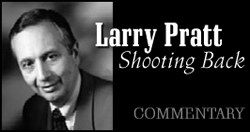SOTOMAYOR: BAD ON GUNS AND THE CONSTITUTION
By
Larry Pratt
August 8, 2009
NewsWithViews.com
On Tuesday, the Senate Judiciary Committee approved the nomination of Judge Sonia Sotomayor and, thus, sent her name to the Senate floor. This is bad news for gun owners, who have much to fear if Sotomayor is confirmed to the Supreme Court.
While it is absolutely certain that she is anti-gun in her views, it is also interesting to note that President Obama's pick is essentially the swap of a Republican liberal (Justice David Souter) for a Democrat liberal (Sotomayor).
Judge Sotomayor's views of her mission as a Latina judge and would-be justice are so controversial that her Senate confirmation is fast becoming a referendum on the role of the judiciary in a constitutional republic.
The Senate needs to remember that if it consents to her appointment, Judge Sotomayor will have a seat on the nation's highest court to hold for life, subject only to removal by the House and the Senate by impeachment for high crimes and misdemeanors. This is a decision for life, with no safety net for the American people. As Thomas Sowell has observed, a talk-radio host's "choice of words ... and the ideas behind them do not change the law of the land, [but he words and actions of Supreme Court justices do."
Is Judge Sotomayor worthy of such an office of trust? We think not. Senatorial scrutiny has revealed to the public that Judge Sotomayor's views are antagonistic to the rule of law, the proper exercise of judicial power, and the meaning of equality in the American constitutional republic.
In making his announcement of Judge Sotomayor's nomination, President Obama emphasized that, if confirmed, Judge Sotomayor would be the first Hispanic American to sit on the nation's highest court. However, what emerged in the days that followed is that, if confirmed, Judge Sotomayor would be the first "Latina" justice of the United States Supreme Court. And there is a difference.
The appointment of a competent and wise individual who happens to be of a certain ethnic or national origin to sit on the nation's High Court would fulfill the commitment of the nation's charter that "all men are created equal," and Martin Luther King, Jr.'s dream that one day people will be judged on the "content of their character" and not on the "color of their skin." But Judge Sotomayor's life message repudiates King's dream. She rejects the nation's pledge that we are an indivisible nation dedicated to "equal justice for all." Indeed, she lacks the essential attributes that America needs in a judge.
First and foremost, Judge Sotomayor does not believe that a judge is duty-bound to administer the law impartially, favoring neither the poor nor the rich, despite the oath of office that she took when she first ascended to the federal bench. Rather, she believes that she only need "aspire" to impartiality as to the parties to a case -- an aspiration that she has stated is "impossible to realize," and which is inferior to her allegiance to her gender and her Latina heritage.
But
if Judge Sotomayor cannot do more than aspire, and cannot achieve impartiality
in ruling on cases and controversies that come before her, not only
should she withdraw her own nomination to the High Court, she should
resign her seat on the Second Circuit. Indeed, according to the Code
of Conduct for Federal Judges, judicial impartiality is essential for
the public to maintain confidence in
the judiciary.
Second, Judge Sotomayor does even not believe that a judge is duty-bound to administer neutral principles of law in resolving disputes between litigants. Although she claims that she is willing to apply the law as it is written; the truth is that she sees herself as a policy maker, using her position as judge to represent those people whose interests, values, and needs coincide with her personal Latina experiences.
But judges are not representatives of segments of the body politic. Rather, they are to be above partisan, gender, ethnic, or political motive. While judges may not always achieve that goal, they should at least seek it -- but not Judge Sotomayor. She would tailor the law as a representative of her Latina constituency, instead of abiding by the rule of law, no matter what the consequences might be to any special interest.
Third, while other judges seek equality under the law, Judge Sotomayor seeks diversity imposed by law. Judge Sotomayor rejects the notion that "affirmative action" must be narrowly tailored only to remedy present injuries caused by past wrongs. Rather, she believes that decisions based upon race, sex, and national origins must be a permanent feature of a diversity policy designed to ensure that government benefits and offices are distributed proportionately to the racial and gender demographics of the larger society.
But there can be no more divisive legal principle than hers -- that the color of your skin, your sex, and your national heritage determine your standing before the law. Again, as Thomas Sowell has so aptly put it: "The Constitution says nothing about diversity and the Constitution is what a judge is supposed to pay attention to, not the prevailing buzzwords of the times."
Judge Sotomayor's views of each of these three essential attributes of a judge -- impartiality, neutrality, and equality -- place her completely outside our constitutional commitment to due process and equal protection under the law.
Underlying Judge Sotomayor's views about judicial partiality, representative favoritism, and demographic diversity is what could only be viewed as an existential legal philosophy grounded in her personal experiences as a Puerto Rican female growing up in the Bronx. While she attempts to clothe that philosophy in a broader "Latina" cloak, she points to no established Hispanic philosophical writings by which to measure the rightness or wrongness of her opinions.
In fact, in a 1996 graduation address at Suffolk University Law School, Judge Sotomayor endorsed the philosophy closest to her own to be the legal realism of Jerome Frank, author of "Law and the Modern Mind," whereby a judge has no standard by which to measure his opinions other than his personal predilections. Thus, in her 1996 speech, Judge Sotomayor celebrated her view that law is not "static and predictable," but "constantly overhaul and adapt [by lawyers and courts] to the realities of ever-changing social, industrial and political conditions."
While Judge Sotomayor, if confirmed, would be only one member of a nine-member court, her appointment would set a dangerous precedent. Having voiced these radical ideas about the type of Justice that she would be, her confirmation would be a ratification of her illegitimate and dangerous views. And it would signal to President Obama and his successors that the door has been opened to other nominees who would misuse their public trust to favor those litigants with whom they identify and to make policy according to their personal experiences.
We who defend the original right of the people to keep and bear arms, secured by the Second Amendment, are especially concerned about the impact of Judge Sotomayor's evolutionary philosophy of law. In a recent unsigned decision handed down by a three-judge panel of the court of appeals, Judge Sotomayor agreed, without providing any explanation why, that our unalienable Second Amendment rights were not "fundamental," and deserved no constitutional protection from a "rational" New York gun control measure. Given Judge Sotomayor's legal philosophy, it would appear that she believes her life's experience growing up in the Bronx influenced her decision, even though they should be wholly irrelevant to which rights are fundamental.
At stake, then, in the Senate confirmation debates on this appointment, is not just the future of Judge Sotomayor, but the very future of the federal judiciary and its constitutionally-prescribed role to "establish justice" and "to secure the Blessings of liberty to ourselves, and our Posterity."
Article II, Section 2 grants to the President the power only to "nominate," but grants to 100 elected Senators the role of providing "the advice and consent of the Senate...." Now that the President has nominated this judge, we, the American people, must do everything we can do to urge the Senate to fulfill its role by withholding consent to this nomination.
|
Subscribe to the NewsWithViews Daily News Alerts! |
To accomplish this goal, we must convince Senators to interpose themselves between President Obama and what he would do to the Court. Judge Sotomayor, by her own words, has declared herself unworthy to take the oath of office required of all federal judges to "administer justice without respect of persons, and do equal right to the poor and to the rich, and ... faithfully and impartially discharge and perform all the duties incumbent upon me ... under the Constitution and laws of the United States. So help me God."
� 2009 Larry Pratt - All Rights Reserved












